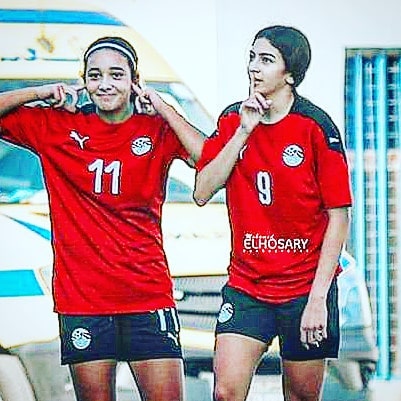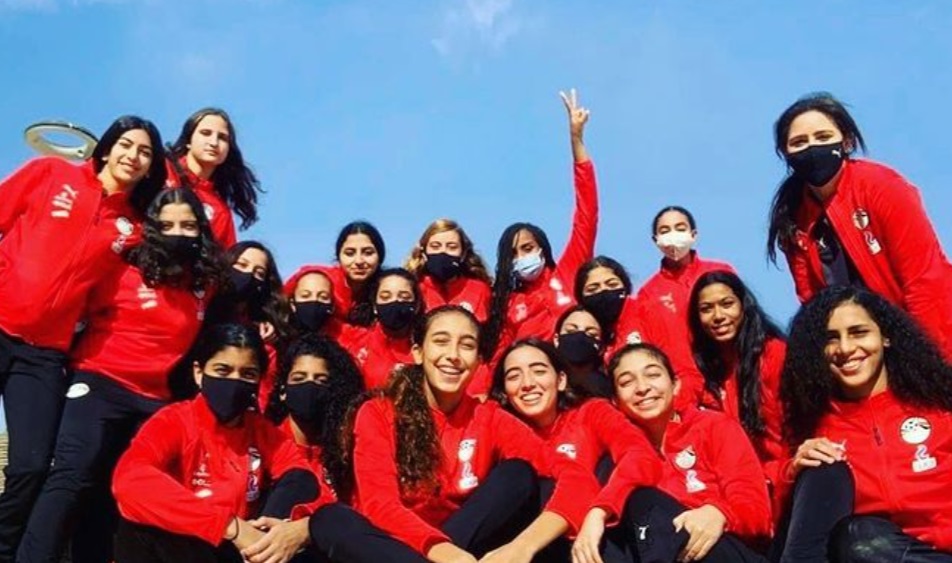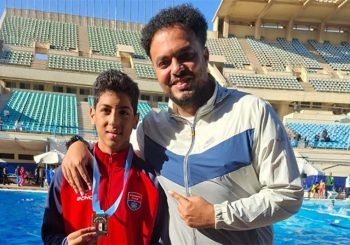In December of 2020, the U20 Women’s Egyptian National Football Team won a match against their Lebanese counterparts. Though at first glance this should be a piece of good news at the end of a difficult year, the torrent of sexist online comments by viewers directed at the young athletes in the aftermath of the match made it anything but. Mere days later, rumours began to surface that the Under 20 (U20) football team would be completely disbanded.
These two pieces of news sparked outrage from the team’s supporters and well-wishers, and social media platforms were flooded with messages of support and rejection of the possibility of the team’s disbanding. The members of the team itself appeared in a video shared on social media appealing to the Egyptian Football Association not to disband their team, adding that they had hoped for more support after the online bullying they faced after the Lebanon match.
The day immediately following the release of this video it was confirmed that the team would, in fact, not be disbanded, and that a Under 17 (U17) Team would be added to the already existing U20 and First Teams, but that the coaching staff would be replaced.
The struggle to turn football – one of the most popular, successful, and profitable sports in the world – into a space for women and men alike is not unique to Egypt. However, in a relatively conservative society where some are opposed to women participating in sports that tend to be associated with men, this is one of the many battles and uphill climbs female athletes have to go through to practice the sport they love and excel at.
Egyptian Streets decided to dig into the details and the truth about this series of events, to understand why some believed the teams would be disbanded, and to discover how all of it was seen by the teams and what it means for the future of women’s football in Egypt.
A Play-By-Play
The controversy around the Egyptian Women’s U20 National Football Team kicked off with a win against the Lebanese Women’s U20 National Football Team on 23 December. The match was broadcast on an Egyptian network, whose social media accounts also posted highlights of the match. This resulted in a number of misogynistic comments from mostly male viewers, either shaming and harassing the players for their athletic attire (which included shorts), or implying that they are unfit to play football due to their gender.
View this post on Instagram
“Among the game’s highlights was an attack made by our team, where one of the players missed a shot on the goal. She was bullied relentlessly online,” the team’s former Assistant Manager Mariam El Reweny told Egyptian Streets. El Reweny said that viewers also made misogynistic comments on an interview she herself gave about the match to the platform FilGoal.
Less than a week later, all activity in women’s football was halted, and the members of the coaching staff were removed from their positions, leading to the surfacing of rumours suggesting that the team would be completely disbanded. The U20 team was one of two women’s national football teams alongside the First Team, both of which were managed by the same staff.
Jayda Mistikawy, one of the players on the team, told Egyptian Streets that the team was very disheartened by what they heard. Although the rumours were at that point unconfirmed, she and her teammates felt that they were not receiving the support they deserved after their win.
“We know that the bullying and the disbanding had nothing to do with each other, but we wanted people to have sympathy with us,” Mistikawy said in reference to the video the players created. “We were really surprised by the rumours and it was a time where we really needed the federation’s support.”
The following day it was confirmed that the team would indeed not be disbanded, but rather that the entire coaching staff would be removed from their positions. This, too, according to Mistikawy, was not good news for the young players. For the younger players, not sufficiently seasoned in the ways of professional sports, continuity of the coaches is necessary to provide the mentoring and human bond that is still important in the budding phase of their development.
“We made a lot of progress with our coaches, and it would take us a lot of time to get used to someone new,” she told Egyptian Streets.
Ultimately, the final decision regarding women’s football in Egypt was that the coaching staff that was in charge of both existing national teams (U20 and First Team) would be removed from their positions. A new U17 national team would be added, and each of the three teams would have their own head coach. The head coaches appointed were Mohamed Kamal for the First Team, Ahmed Ramadan (who was previously the head coach for both teams) for the U-20 Team, and Mohamed Mohsen for the U-17 team. The remaining staff has not been announced for any of the teams, and it appears the head coaches will not be the ones deciding who they work with.
Conflicting Signals
Through the reporting of Egyptian Streets, it was corroborated three times by Mistikawy, El Reweny, as well as the newly appointed head coach of the U17 women’s team Mohamed Mohsen, that there was no mention of the intention to completely disband the U20 team. However the removal of the coaching staff from their positions created confusion in light of several changes taking place in Egyptian football.
Early last year, a five-member committee headed by Amr El-Ganainy was appointed by FIFA as an interim body governing the Egyptian Football Federation (EFA) until elections can be held (as the precautions related to the COVID-19 pandemic made holding elections for a new board for the federation impossible). Among the five members was Sahar Abdelhakk, who was in charge of the file of women’s football, beach football, and futsal. After the expiry of this committee’s term, a new three-person committee headed by Ahmed Megahed, was appointed with no overlap in the members. This meant that there was no longer a single person dedicated to the file of women’s football, which led many to conclude that it will not be among the priorities of the three-member committee.
The decision to remove the coaching staff came alongside other decisions or deliberations to go back on several of the previous committee’s decisions, such as unifying the ball design, the kit deal with Puma, and the use of Video Assisted Refereeing (VAR). These decisions and deliberations occurring in quick succession led some to speculate whether the current three-member committee was intentionally undoing what the five-member committee had done, as part of Egypt’s football world’s rivalry.
A source close to the team that asked to remain anonymous told Egyptian Streets that they believed that rumours surfaced suggesting the disbanding of the U20 Women’s National Team because, indeed, there had been an intention to disband it to only recall it when a tournament was in sight, adding that such a decision would stand in the way of the team’s development and its chances of success.

“The girls fail when they have no base. Training regularly together gives them that. If they don’t they won’t be in sync with each other and they will be unable to play at their best or to create chances,” the source told Egyptian Streets.
The source further claimed that it was the public’s negative response to the rumour that led to the committee backtracking on the thus far not yet announced decision.
The Struggle Continues
But even with the refutation of the rumour of the team’s disbanding, many were unhappy with the sacking of the coaching staff. The head coach Ahmed Ramadan and his team, as Mistikawy and El Reweny recount, were highly dedicated to the teams’ success and development.
“The girls felt like they were achieving more, developing more. We worked with the girls from A to Z,” El Reweny told Egyptian Streets. “We did things with the girls some of their clubs weren’t even doing. We didn’t have to do any of it. We could have just stayed home [until the national team is called for an engagement] and gotten our salaries, and no harm would come to us. But we used to go out nearly every day for two months and train both the U20 and the First Team.”
However the feedback to the new decision was not all bad. Although it remains unclear who will be aiding the newly appointed coaches, the new U-17 coach Mohamed Mohsen told Egyptian Streets that he considers having a coach for each team a good step.
“I personally believe that having one coaching team completely focused on one team is much more beneficial than one coaching team dividing their attention between several,” Mohsen told Egyptian Streets. “What if he has two matches for two different teams in the same weeks? Two teams, two camps, it’s hard to focus on both.”
Mohsen further explained his viewpoint by saying that younger teams need more guidance and more exposure to play to be able to develop and mature as football players.
Currently, the players are not likely to gather in their national teams until March as the national league is ongoing and each of the players are more focused on their clubs. Mohsen explained that before then, it is likely that the budgets for the women’s football teams will be decided, as well as the remaining members of the coaching staff of each team.
But women’s football in Egypt still hangs by a thread. With support from the EFA in short supply and media attention almost nonexistent, coaches and staff struggle to find ways to motivate their players.
“Any football association in the world cares more about men’s football than about women’s,” Mohsen told Egyptian Streets. “It generates more revenue, it gets more attention, there are many reasons. But here, the gap between men’s football and women’s football is humongous.”
Like El Reweny, Mohsen lamented that there was no longer anyone in the EFA that is focused specifically on women’s football, leading to it often being an afterthought.
“There is little support for the teams and the national league, and even less media attention. Nobody on TV talks about who won, no channels broadcast the matches,” Mohsen said. “People made fun when they saw the Lebanon game because they had never been exposed to women’s football. If they had the chance to watch women play football more, if they heard media personalities like Seif Zaher, Ahmed Shobeir, or Amr Adeeb talking about women’s football, they wouldn’t have this response.”
Such media attention would have a significant effect on players’ morale and motivation, and normalise women’s football not only to viewers, but also to families who are reluctant to allow young women to make competitive sport a part of their lives.
The team of young girls who found themselves inexplicably and suddenly under fire are among many budding talents in women’s football in Egypt whose talents are often not given the chance to grow due to circumstances that are rarely in their favour. All those involved in women’s football in Egypt believe that further support and investment from the EFA and the media could remedy many of the issues that stand in the way of women’s football in Egypt.







Comments (3)
[…] The Truth Behind the Story of the U20 Women’s Football Team and What it Says About Egyptian Wo… […]
[…] The Truth Behind the Story of the U20 Women’s Football Team and What it Says About Egyptian Wo… […]